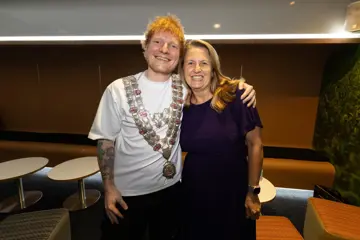It's no secret that Australia is home to plenty of amazing talent, and thanks to contemporary names such as Amyl And The Sniffers, Tame Impala, King Gizzard & The Lizard Wizard, and more, it's clear that markets like America are hankering for more music from Australia more than ever.
However, it's equally no secret that when it comes to touring those markets, things have never been more difficult.
Thanks to Donald Trump's America, foreign visitors have found it harder to find their way into the country, regardless of whether their intentions are good or not. As a result, more and more artists have found themselves forced to change their touring options.
Artists like Sheppard have axed their US touring plans, labelling it unsustainable; while other acts – such as veteran punk outfit UK Subs – claimed their American tour was canned due to their previous criticism of the current administration.
Needless to say, it's an unenviable position for foreign acts to find themselves in, and for Brian Zabinski – who has been helping performing artists navigate the work visa process since 2012 thanks to his work with CoveyLaw, and also volunteers with pro bono legal assistance organisation TamizdatAVAIL – he understands just how difficult it's become.
Don't miss a beat with our FREE daily newsletter
Speaking to The Music ahead of an appearance at BIGSOUND in Brisbane next week for the US Travel workshop, Zabinski explains that there is a lot that artists need to be putting into consideration before heading to the US for their first tour.
"Before an individual artist or a band books a tour, it's important to determine whether or not they are actually eligible for a work visa in order to tour the US," he explains. "For solo-artists or artists that are primarily renowned as individuals, they would need to seek an O-1 'individual of extraordinary ability' work visa, which requires that an artist has achieved 'prominence' in their field, such that they are at or near the top of their field through evidence of national or international acclaim.
"For members of performing groups or bands, these applicants would seek P-1 'internationally recognised' visas. P-1 visas are for individuals whose renown stems from their work with a group. In order to be eligible for the P-1 visas, the group needs to show they have been established and performing regularly for a period of at least one year and that they have achieved international recognition."
That is to say, it's probably not a great idea for artists to attempt to tackle the US circuit if they've only released one song and boast single-digit streams. But that's also not to say it's impossible to do so.
However, while attempting to tour before reaching prominence is likely something younger artists may find, Zabinski also notes that booking a tour before confirming eligibility for visas (and also not leaving enough time to sort said visas) is a common issue artists run into.
Despite this, Zabinski does admit there have been many issues that foreign nationals have uncovered while attempting to visit the US. But, is it actually a problem for artists?
"Over the past six months of the current administration, we are seeing very few examples of artists or bands running into issues arriving at the US with a work visa stamp in their passport," he explains. "So, artists with the proper work visas are being admitted into the US at a very high rate. Of course, this is an evolving situation and could change.
"There has been scary news about detentions and deportations, and some countries have issued warnings about traveling to the US It remains very hard to tell how much of the media coverage is identifying extreme and harmful policy changes (definitely some of it) and how much is merely bringing attention to routine (but still appalling) US immigration enforcement (probably more of it)."
As he points out, while passport control officers have been employing more scrutiny in terms of assessing travellers' plans for their time in the US and their potential to misuse their visas, there's possibly a solid chance you won't need to worry too much.
"We can say this with fair confidence: if you are coming to the US and you are planning to comply with US rules and regulations, are prepared to explain your plans, and you have no record of prior immigration or criminal issues, you will probably be fine," he says.
"On the other hand, traveling to the US right now bears heightened risks for anyone whose circumstances or record or planned activities in the US present any challenge or complexity to their admissibility to the US.
"In any case, if you’re entering on a work visa, be ready to clearly and confidently articulate the nature of your work, your role, and the company or project you’re involved with," he adds. "If you are coming to do work-related activities, but you are not coming on an employment visa, be especially ready to explain why your planned activities are allowed."
Arguably, the biggest issue that is facing potential visitors to the US is how their viewpoints may align with those of the current administration. That is, if you're someone who has been known to be a little critical of the way things are in an outspoken, public way, your chances of entry aren't exactly great.
"Some highly publicised detentions and deportations have been linked to a foreign national’s activism and activist presence on social media, but we are not routinely seeing artists or bands denied visas or denied entry to the US at ports of entry based on their social media or other public comments," Zabinski explains. "This could change.
"It is important to understand that Immigration officers at ports of entry may search publicly available information—including your social media and online profiles. In many circumstances they may also confiscate and search your electronic devices.
"To date, US Customs and Border Protection appears principally to be looking for information regarding your planned activities in the US," he adds. "But if an officer discovers politically sensitive statements in your devices, it is reasonable to assume this will not improve your chances of being admitted to the US."
Additionally, transgender, intersex, or nonbinary individuals have also found themselves with heightened fears as a result of the increased scrutiny for travellers entering the country. As Zabinski explains, these individuals may want to ensure they adhere to the expectations of the US' current rules and bring any additional documentation that may help their entry prospects.
"The Department Of State has clarified that valid foreign passports with 'X' gender markers will be considered valid by US embassies, consulates, and at US ports of entry," he explains. "However, when completing a visa application or ESTA application, travelers are now required to state their 'sex at birth' (whatever that means), so individuals whose passports or visas do not match this stated 'sex at birth' may be asked to provide additional documentation, like birth certificates or name change documentation.
"The ACLU (American Civil Liberties Union) has broadly recommended that travelers carry backup documents like birth certificates and legal proof of name changes be carried as well, and we would add that people traveling with employment-based visas should carry a copy of their I-797 approval notice (the document that is issued after a work visa petition is approved).
"It should also be noted that, unfortunately, the rhetoric and actions of the current administration may embolden individual officers to be hostile," he adds, urging caution should still be employed. "Mostly, we encourage trans, intersex, and nonbinary travelers who have any doubts or questions to contact legal counsel to make sure the specifics of your situation are addressed."
Another fear potentially faced by artists attempting to travel to the US is the costs involved, and how issues faced in this regard may result in unexpected hits to the touring budget.
At the end of the day, it's vital to be prepared and understanding of what is involved in the entire process, Zabinski says.
"It's important to note that the biggest cost involved is the attorney's or immigration assistance provider's fees, as filing the forms and documentation with USCIS has become so complicated that it can be confusing for individuals who are unfamiliar with the process," he explains.
"Otherwise, it's important to understand that the USCIS has two processing rates at which they process the work visa petitions: Regular Processing and Premium Processing. Regular is cheaper, but doesn't guarantee a response time and legally the US government can take as long as they want to adjudicate the application.
"We file so many petitions out of our office we're seeing Regular Processing cases taking anywhere from three to ten months to be approved lately," he adds. "This slowdown of Regular Processing cases definitely seems to have stemmed from the new administration. The USCIS also has their Premium rate which is more expensive and guarantees a response in 15-business days or less.
"So, the best way to try to keep the costs down is to try to file the petition as far in advance as possible."
For those who are still determined to tour the US and are unfazed by current issues that may face travellers, Zabinski explains that while those who are working with a "US label, manager, agent, festival, promoter or presenter" may be able to find aid, he also suggests looking into other resources to get that extra advice.
"Artists From Abroad is an enormously helpful resource with excellent information on the US artist visa process, as well as tax issues faced by artists touring in the US ," he explains. "TamizdatAVAIL is a pro bono legal assistance organization, funded in part by the US Government, to help artists through the US visa process. They can help if you already have a petition filed, but have encountered problems.
"League Of American Orchestras provides excellent advice to orchestras," he adds. "On The Move is a Brussels-based artist mobility advocacy group that runs a coalition of national “Mobility InfoPoints” that provide pro bono assistance to artists trying to travel to their countries."
Brian Zabinski will appear at the US Travel workshop at BIGSOUND in Brisbane on Thursday, September 4th.
















